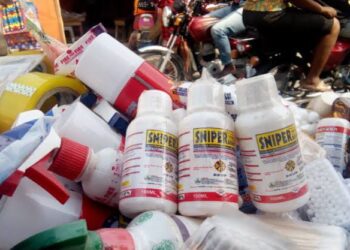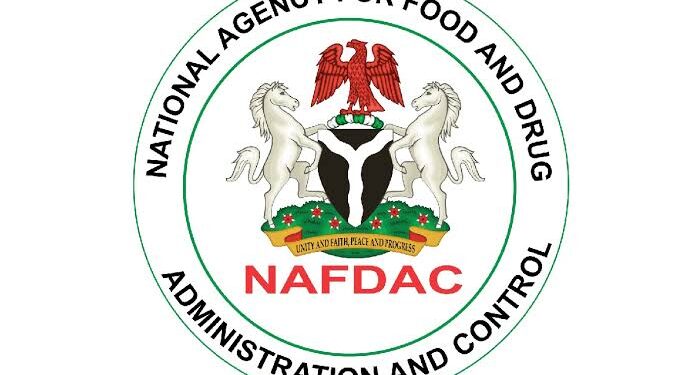The National Agency for Food and Drug Administration and Control (NAFDAC) issued a strong warning against the dangerous practice of using Sniper, a brand name for dichlorvos, to preserve food.
This follows a recent viral video showing improper food treatment with chemicals.
NAFDAC stressed the risks of dichlorvos to human health, both short-term and long-term.
These dangers include dizziness, vomiting, breathing difficulties, tremors, and even death. Long-term exposure can lead to memory loss, reduced fertility, birth defects, and potential cancer.

The agency highlighted that the sale of small bottles of dichlorvos (100 ml or less) has been banned since 2019.
The larger size (1 liter) is only available at authorized agrochemical stores. NAFDAC emphasized that dichlorvos is not for food preservation and should never be applied directly to food.
NAFDAC expressed concerns in a statement signed on Sunday by Sayo Akintola, the resident media consultant, regarding the recent viral video that showed people utilizing harmful chemicals to preserve food items like crayfish, stockfish, and beans.
Dr. Rametu Momodu, the Director of Veterinary Medicine and Applied Products (VMAP), reaffirmed that it is not authorized to use specific chemicals, particularly pesticides, to safeguard crops and keep beans from having weevils.
She clarified that certain pesticides are authorized for use as fumigants and that these should be applied in accordance with the directions provided by the manufacturer on the product label.
Momodu went on to explain that eating food contaminated with dichlorvos might result in a coma and death in certain situations, as well as symptoms including vomiting, dizziness, breathing difficulties, tremors, and convulsions.
Pesticide residues stay on or in food after usage, causing serious health hazards, the speaker cautioned. Washing the meal won’t lessen the danger because the dangerous material will have seeped into it already.
Adeyeye, the Director of NAFDAC, underlined the need for alternate food preservation techniques and mentioned biopesticides as a safer substitute for dichlorvos.
If food isn’t refrigerated, it may signal pesticide contamination rather than freshness, according to her observation of food that hasn’t gone bad for a long time.
NAFDAC officials urged people to avoid buying food from vendors suspected of using such chemicals and to report them to the agency. Safer alternatives, like bio-pesticides were recommended.
The agency also addressed concerns about food spoilage. They clarified that extended shelf life without refrigeration could be a sign of pesticide contamination, not freshness.
Why this matters
This is a serious public health issue because consuming food treated with Sniper (dichlorvos) can cause immediate harm or long-term health problems, even death.
Not only does it endanger people’s health, but it also deceives them into thinking food is fresh. Thankfully, NAFDAC is working to prevent this by banning small dichlorvos bottles, educating the public, and promoting safer alternatives for food preservation.
Bottom Line
NAFDAC remains committed to ensuring food safety. They have implemented several measures, including: Banning small dichlorvos bottle, Educating stakeholders about proper food handling, Conducting laboratory tests to monitor pesticide residue levels, Regularly inspecting vendors for compliance.
NAFDAC acknowledges the challenges faced by farmers due to chemical bans and emphasizes the importance of adopting safer alternatives.

















